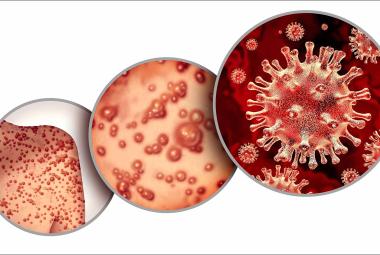At present there is enormous concern about the birth defects believed associated with infections for an old virus called Zika during pregnancy.
Information concerning the Zika Virus and its implication in microcephaly has been reported in many countries, including the USA.
Basically the following facts are known:
What is the Virus:
- The Zika virus is primarily spread by mosquito bites from the infected Aedes species mosquito (A. aegypti and A. albopictus). While it is pretty clear that Zika "may" be responsible for the high percentage of fetal abnormalities (particularly microcephaly or small head), it is too early in this research to know with certainty that Zika is the cause of all these birth defects. We'll know more later.
- Remember, Aedes mosquitoes are aggressive daytime biters and feed both indoors and outdoors. They can also bite at night.
Areas with Zika:
- Africa, Southeast Asia, Pacific Islands, Mexico, Brazil, Puerto Rico and the US Virgin Islands, and many other countries in South America.
- In the USA, this mosquito is prevalent in the southern states, Texas, Florida, Alabama, and other "southern" states. Although infected mosquitoes have not been found in the USA yet, and ONLY reported in returning travelors.
Is it Spread in other ways:
- Recent evidence has suggested that it might be spread via saliva or a males semen. Pregnant mothers should use protection (condoms) with members whose partners may have been exposed to the Zika Virus. Zika virus was found in the semen of one individual at least two weeks AFTER exposure. It is not known how long it persists. It is not known if a female can transfer the virus via sexual content to a male partner.
If you have a Zika infection:
- During the first week of infection, Zika virus can be found in the blood and passed from an infected person to another mosquito through mosquito bites, and perhaps by kissing. An infected mosquito can then spread the virus to other people.
- Avoid having sex with pregnant women.
- To help prevent others from getting sick, avoid mosquito bites during the first week of illness.
- At present, there is no evidence that once Zika has cleared the mothers system, that it is infectious in future pregnancies.
Should you travel to areas infected with the Zika virus:
- The CDC recommends against traveling to Zika infected areas, or if you do go, use extreme precautions (insect repellent, insect sprays, mosquito nets, etc) to prevent being bitten by this mosquito.
Will being having a Zika infection affect future pregnancies.
- While it is not known with certainty the risk to the baby if a woman is infected with Zika virus while she is pregnant, however, Zika virus infection does NOT pose a risk of birth defects for future pregnancies.
- Zika virus usually remains in the blood of an infected person for about a week. The virus will not cause infections in a baby that is conceived after the virus is cleared from the blood. So if you've already had the Zika infection, there is no known risk to future pregnancies.
What about infections in a newborn infant:
- At present we do not know if a Zika infection occuring early after birth can damage the brain of an infant. However, there have been no reports of this yet. Thus far, all reports of microcephaly have been during "pregnancy".
Is there a vaccine:
- At present there is no Antiviral or Vaccines to prevent Zika virus infection.
Symptoms of Zika Virus
- Only 1 in 5 people infected with Zika virus become ill or show symptoms. Symptoms only last several days to a week.
- The most common symptoms are: muscle and joint pain, headache, Red inflammed eyes, and a maculopapular rash.
- Symptoms of Zika virus infections are somewhat similar to Dengue and Chikungunya disease which are spread by the same mosquito. However, the rate of "red eyes" or conjunctivitis is much higher in Zika.
Treatment:
- Get plenty of rest
- Drink fluids to prevent dehydration.
- Use acetaminophen to relieve fever and pain. Do not use aspirin or ibuprofen or naproxen NSAIDs.
Breastfeeding and Zika:
- Many viruses transfer into human milk, however, most are not infectious. Human milk seems to inactivate many virus. At present it is well known that the Zika virus is transmitted into human milk. However, there is NO evidence that Zika causes infections in the breastfed infant. The CDC still recommends breastfeeding in mothers with Zika infections.
See the CDC Website for More information: http://www.cdc.gov/zika/index.html







